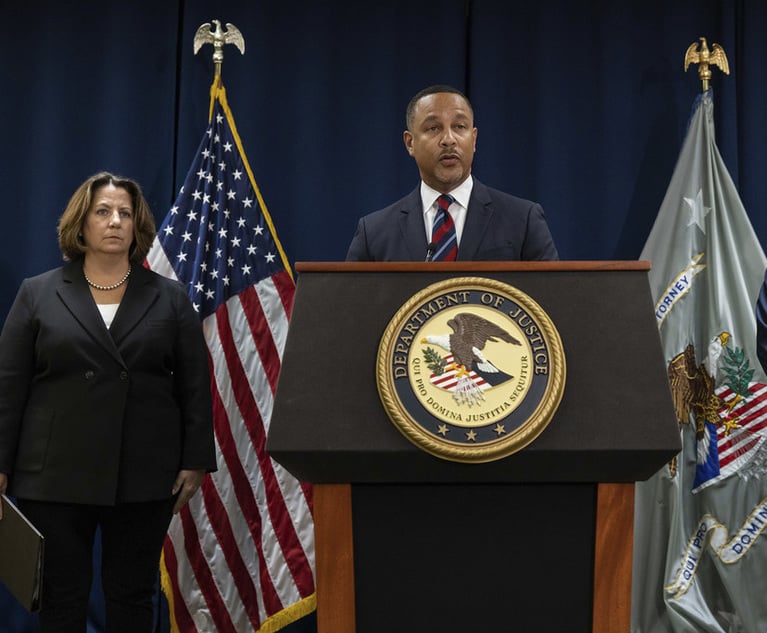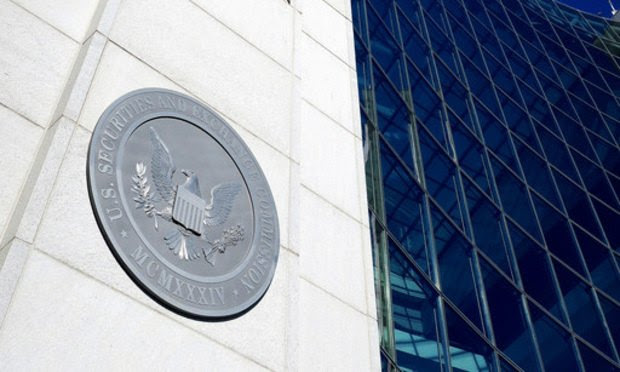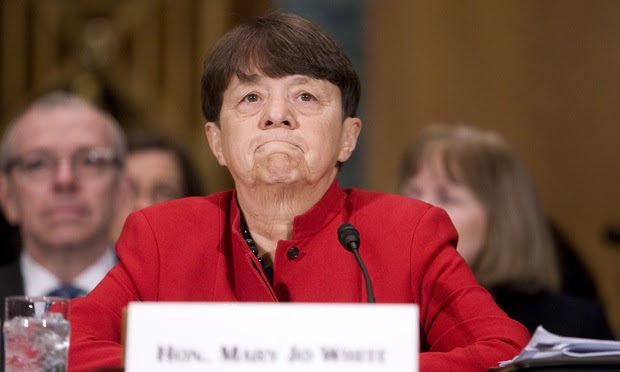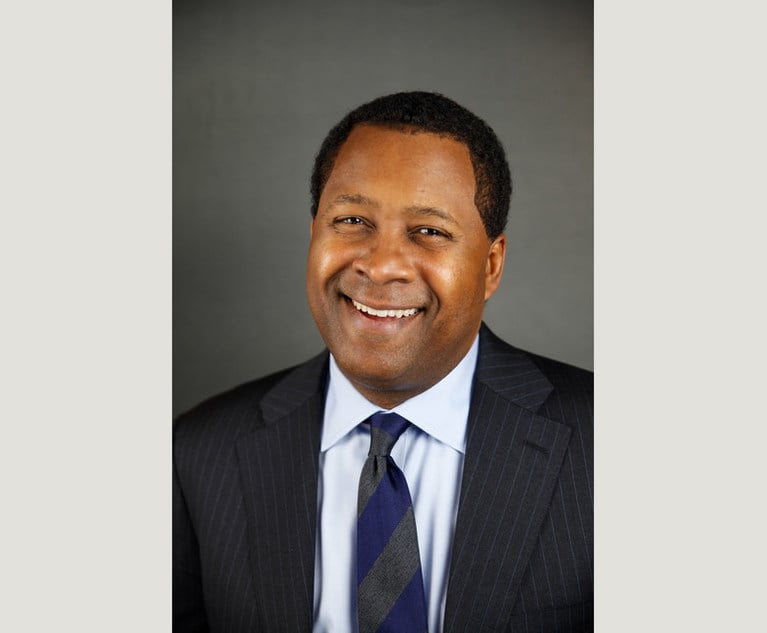Compliance Hot Spots: SEC's Ex-Whistleblower Chief Raises Concerns | A 'Never Trump' Saga | Trends in DPAs | Who Got the Work
The former head of the SEC's whistleblower team has some thoughts on the Trump-era commission's move to restrict awards. Plus: we've got the back story on how a Covington partner won, then lost, the ZTE compliance monitorship. Scroll down for Who Got the Work, moves and more. Thanks for reading!
February 05, 2019 at 09:00 PM
10 minute read
Welcome to Compliance Hot Spots, our weekly look at the regulatory and white-collar enforcement world. Thanks for reading—and please continue to send feedback. I appreciate hearing from you about what's on your plate—observations, trends, new clients. I'm at [email protected] and 202-828-0315, or follow me on Twitter @cryanbarber.
Ex-SEC Whistleblower Chief Calls Tipster Proposal 'Misguided'
Eight years ago, Sean McKessy began building up the U.S. Securities and Exchange's newly created whistleblower office with the hope it would evolve into a force to help the agency police the markets.
In the years since, the whistleblower office has won plaudits as it doled out millions of dollars in bounties and, year after year, reached new heights in total tips received. In 2015, the SEC's chairwoman at the time, Mary Jo White, described the program as a “game changer” for the agency.
Could the whistleblower program, designed to inspire tipsters to step forward, soon take a step back? McKessy, now a partner at the whistleblower firm Phillips & Cohen, fears the SEC is taking it in that direction.
 Sean McKessy
Sean McKessyMcKessy has emerged as a vocal critic of proposed changes to the program that would give SEC commissioners more control over awards, allowing them to reduce the largest bounties so that the sum “does not exceed an amount that is reasonably necessary to reward the whistleblower.” Under the existing rules, whistleblowers can receive between 10 percent and 30 percent of monetary penalties. The proposed change would allow the SEC to lower awards to $30 million in cases where whistleblowers would otherwise be entitled to more.
There's no question that $30 million is still a hearty haul. But, on the New York University School of Law “Compliance and Enforcement” blog, McKessy makes the case for how the rule change could discourage high-level whistleblowers from putting their careers on the line to come forward and expose large-scale fraud.
“The opportunity to incentivize someone to stop the next Enron before the company collapses would be lost,” McKessy wrote.
“The proposed rule to limit SEC whistleblower awards is a misguided effort that could damage the program. It seems to be a 'solution” for a non-existent problem,'” McKessy said. “The SEC's own data shows that less than 5 percent of all of the individuals paid whistleblower awards have received over $30 million. And it's the big awards that inspire other whistleblowers to step forward and help balance the risks they take.”
The SEC voted to 3-2 in June to push forward the proposal, with the two Democratic members dissenting over concerns that the changes would undermine the whistleblower program. The SEC received dozens of comment letters in September and has not yet voted to formally adopt the rule changes.
McKessy has previously taken aim at proposed “interpretive guidance” for awarding outside analysts who reveal fraud and other misconduct through sophisticated reviews of publicly-available information. The proposed guidance says independent analysis must go “beyond what would be reasonably apparent to the commission from publicly available information” in order to be worthy of an award.
McKessy envisioned the guidance resulting in outside analysts being denied awards, with the SEC determining years after enforcement actions—and with the benefit of hindsight–that it could have sniffed out the misconduct on its own.
“This is the most dangerous in the long term for the program,” he told the National Law Journal. “It's injecting in the opportunity for human beings, well after the fact, to make subjective determinations that I don't think were intended by Congress.”
>> More reading: If you get some time, check out this recent deep-dive over at The New Yorker: “The Personal Toll of Whistleblowing.” Sheelah Kolhatkar gives us a rare look inside the life and times of a health care whistleblower.
Compliance Headlines & Analysis: Reading List
>> “Tenth Circuit Affirms SEC's Extraterritorial Reach.” A team from Debevoise & Plimpton—including former Obama-era SEC Chair Mary Jo White (above)—posted new analysis over at New York University School of Law's compliance and enforcement page. “The decision makes clear that U.S. regulatory authorities, unlike civil litigants, may enforce the anti-fraud provisions of the U.S. securities laws abroad and pursue actions against those outside the U.S. where the “conduct-and-effects” test can be satisfied,” the Debevoise team, including partners and former top SEC officials Kara Brockmeyer and Andrew Ceresney, write. Read the Tenth Circuit's decision here.
>> “How a 'Never Trump' Covington Partner Won, Then Lost, Lucrative ZTE Monitorship.” This is my deep-dive this week on how Secretary Wilbur Ross granted—then rescinded—the ZTE compliance post to Covington & Burling partner Peter Lichtenbaum in Washington. Commerce had a press release ready to roll, according to newly acquired public records I obtained from a FOIA request. An 11th-hour scramble, revealing Licthenbaum's name on a “Never Trump” letter, derailed the offer. A Williams & Connolly partner tells me the episode raises broad First Amendment questions.
>> “Trends In DOJ Nonprosecution, Deferred Prosecution Deals.” Lawyers from Gibson, Dunn & Crutcher—partners F. Joseph Warin and Kendall Day, and associate Melissa Farrar—recently wrote in a piece at Law360: “Although the overall numbers of DPAs and NPAs have declined since the change in administrations at the beginning of 2017, the statistics and patterns emerging from NPAs and DPAs in 2018 suggest these vehicles remain favorite tools of prosecutors and are being deployed aggressively.”
>> “Chamber of Commerce Decides Bipartisanship Is Good Business.” The Chamber is overhauling a scoring system in a move to boost bipartisanhip. “It is a significant shift and represents the chamber's recognition that a better functioning government might better serve its own interests—and its members—than persistent stalemate of the type that just caused a government shutdown, the longest on record. [The New York Times]
>> “Converging Risks Defy Traditional Corporate Compliance Silos.” Jo Ritcey-Donohue is the founder of JRD Law PLLC in Washington says “global businesses already are contending with considerable turbulence impacted by rapidly evolving U.S. national security threats and related cross-border compliance risks.” [Corporate Counsel]
>> “State Attorneys General Continue to Fill the Enforcement Gap for Consumer Protections.” A team from Hunton Andrews Kurth advises: “Enforcement actions for violation of state UDAAP statutes are of particular concern for financial institutions, lenders, and servicers because many states' statutes are extremely flexible in permitting enforcement actions for any act deemed unconscionable or unfair.”
>> “U.S. Regulator Drops Fine Against Citi Over Fair-Lending Claims.” The report says “the decision is sure to be watched by consumer advocates who have questioned whether the Office of the Comptroller of the Currency (OCC) will enforce fair lending rules under the leadership of Joseph Otting.” [Reuters]
>> “Crypto Work Still Priority of Law Firms Despite Burst Bubble.” From the report: “Major law firms that decided several years ago to advise clients on cryptocurrency matters aren't backing down, despite the recent plummet in value of digital currencies like Bitcoin.” [Bloomberg BNA]
>> “Aides and Ex-Lawmakers Found Fast Post-Election Lobbying Jobs.” See who Akin Gump, Holland & Knight, and Brownstein Hyatt picked up. [Bloomberg BNA]
Who Got the Work
>> Jared Gardner, a Perkins Coie counsel in Alaska, was on the Ninth Circuit appeals court team representing James D. Crombie, co-founded of the investment firm Paron Capital Management LLC, in a civil enforcement action brought by the U.S. Commodity Futures Trading Commission. CFTC assistant general counsel Martin White argued for the agency. The appeals court affirmed the agency's restitution order but vacated the part of the trial judge's ruling that issued a permanent injunction against Crombie, who was accused of duping investors. Read the decision here.
>> Thompson Coburn partner Jan Miller in St. Louis, a former U.S. attorney who's now chair of the firm's white-collar defense and investigations practice, represented Australian businessman David Levick in a sanctions case in Washington's federal trial court involving the export of restricted technology to Iran. Levick pleaded guilty on Feb. 1. Sentencing is set for March 21. Read the plea agreement here.
>> Pillsbury Winthrop Shaw Pittman—including publicly policy partners Brian Finchand Craig Saperstein—has registered to lobby for California-based Attivo Networks. The advocacy will focus on “cybersecurity issues, defense and homeland appropriations and authorization, and federal cybersecurity standards.”
Notable Moves & Announcements
Our weekly roundup of notable moves and announcements. Got news to share? [email protected] and 202-828-0315.
• Robin Dunn is joining Dechert's global litigation practice as a partner and will lead the firm's consumer finance litigation practice. Dunn, who arrives from Davis Wright Tremaine, earlier served as senior associate general counsel at Capital One from 2015 to 2017 and as counsel at American Express from 2012 to 2015. “Robin's previous in-house financial services perspective brings a wealth of both legal and business knowledge to Dechert, and we are excited to have her on board,” David Kelley, co-leader of Dechert's white-collar and securities litigation practice, said in a statement.
• Marc Fagel, co-chairman of Gibson, Dunn & Crutcher's securities enforcement group, is leaving the firm effective Feb. 28. Fagel formerly led the San Francisco regional office of the U.S. Securities and Exchange Commission. The regional director spot was most recently held by Jina Choi, who announced her departure in November.
• Arnold & Porter announced that Anna Thompson, former associate chief counsel for enforcement in the U.S. Food and Drug Administration's office of the chief counsel, rejoined the firm as counsel. Thompson, based in Washington, will be a member of the product liability litigation practice.
• Elizabeth McFadden, a U.S. Education Department lawyer, has left the agency to become the SEC's deputy general counsel for general law and management. In that role, she'll oversee the representation of the SEC and its staff in litigation and serve as a legal adviser for the commission and its various divisions. “We are excited to have Elizabeth join us at the Commission,” said SEC general counsel Robert Stebbins. “I am confident that given her extensive experience and legal expertise, the Commission and its employees will greatly benefit from her legal counsel.”
• David Hanke will be a partner in Arent Fox's expanded international trade and national security practice in Washington. Hanke is joining the firm from Capitol Hill, where he served on the the U.S. Senate Select Committee on Intelligence and a lead policy advisor to Senator John Cornyn, R-Texas.
• “The White House is assigning one of its lawyers to a new communications role to handle the stepped-up oversight coming from Democratic-led congressional committees, among other issues,” The Wall Street Journal reports. Steven Grovesformerly worked at the Heritage Foundation and the Senate's Permanent Subcommittee on Investigations. The assistant special counsel will become a deputy press secretary. Check out my report with Ellis Kim on the Kirkland & Ellis pipeline to the Trump administration.
• Facebook has hired two new privacy policy managers. Nate Cardozo, a longtime senior information security counsel at the Electronic Frontier Foundation, and Robyn Greene, senior policy counsel at the Open Tech Institute, separately announced they would soon join Facebook as privacy policy managers.
• Humana Inc. has promoted Joseph Ventura to general counsel and named Douglas Stoss interim head of the office of corporate affairs. Ventura, who succeeds Christopher Todoroff, first joined Humana in 2009. Earlier, Ventura was an associate in the New York office of Alston & Bird, where he focused on securities regulation and compliance, M&A, Sarbanes-Oxley and other corporate governance matters. My colleague Kristen Rasmussen has more here at Corporate Counsel.
This content has been archived. It is available through our partners, LexisNexis® and Bloomberg Law.
To view this content, please continue to their sites.
Not a Lexis Subscriber?
Subscribe Now
Not a Bloomberg Law Subscriber?
Subscribe Now
NOT FOR REPRINT
© 2025 ALM Global, LLC, All Rights Reserved. Request academic re-use from www.copyright.com. All other uses, submit a request to [email protected]. For more information visit Asset & Logo Licensing.
You Might Like
View All
Compliance Hot Spots: GOP Eyes ESG as an Antitrust Issue + Another DOJ Crypto Seizure + Sidley Partner Jumps to Main Justice
9 minute read
Compliance Hot Spots: Lessons from Lafarge + Fraud Section Chief Talks Compliance + Cravath Lands FTC Commissioner
11 minute readTrending Stories
- 1'It's Not Going to Be Pretty': PayPal, Capital One Face Novel Class Actions Over 'Poaching' Commissions Owed Influencers
- 211th Circuit Rejects Trump's Emergency Request as DOJ Prepares to Release Special Counsel's Final Report
- 3Supreme Court Takes Up Challenge to ACA Task Force
- 4'Tragedy of Unspeakable Proportions:' Could Edison, DWP, Face Lawsuits Over LA Wildfires?
- 5Meta Pulls Plug on DEI Programs
Who Got The Work
Michael G. Bongiorno, Andrew Scott Dulberg and Elizabeth E. Driscoll from Wilmer Cutler Pickering Hale and Dorr have stepped in to represent Symbotic Inc., an A.I.-enabled technology platform that focuses on increasing supply chain efficiency, and other defendants in a pending shareholder derivative lawsuit. The case, filed Oct. 2 in Massachusetts District Court by the Brown Law Firm on behalf of Stephen Austen, accuses certain officers and directors of misleading investors in regard to Symbotic's potential for margin growth by failing to disclose that the company was not equipped to timely deploy its systems or manage expenses through project delays. The case, assigned to U.S. District Judge Nathaniel M. Gorton, is 1:24-cv-12522, Austen v. Cohen et al.
Who Got The Work
Edmund Polubinski and Marie Killmond of Davis Polk & Wardwell have entered appearances for data platform software development company MongoDB and other defendants in a pending shareholder derivative lawsuit. The action, filed Oct. 7 in New York Southern District Court by the Brown Law Firm, accuses the company's directors and/or officers of falsely expressing confidence in the company’s restructuring of its sales incentive plan and downplaying the severity of decreases in its upfront commitments. The case is 1:24-cv-07594, Roy v. Ittycheria et al.
Who Got The Work
Amy O. Bruchs and Kurt F. Ellison of Michael Best & Friedrich have entered appearances for Epic Systems Corp. in a pending employment discrimination lawsuit. The suit was filed Sept. 7 in Wisconsin Western District Court by Levine Eisberner LLC and Siri & Glimstad on behalf of a project manager who claims that he was wrongfully terminated after applying for a religious exemption to the defendant's COVID-19 vaccine mandate. The case, assigned to U.S. Magistrate Judge Anita Marie Boor, is 3:24-cv-00630, Secker, Nathan v. Epic Systems Corporation.
Who Got The Work
David X. Sullivan, Thomas J. Finn and Gregory A. Hall from McCarter & English have entered appearances for Sunrun Installation Services in a pending civil rights lawsuit. The complaint was filed Sept. 4 in Connecticut District Court by attorney Robert M. Berke on behalf of former employee George Edward Steins, who was arrested and charged with employing an unregistered home improvement salesperson. The complaint alleges that had Sunrun informed the Connecticut Department of Consumer Protection that the plaintiff's employment had ended in 2017 and that he no longer held Sunrun's home improvement contractor license, he would not have been hit with charges, which were dismissed in May 2024. The case, assigned to U.S. District Judge Jeffrey A. Meyer, is 3:24-cv-01423, Steins v. Sunrun, Inc. et al.
Who Got The Work
Greenberg Traurig shareholder Joshua L. Raskin has entered an appearance for boohoo.com UK Ltd. in a pending patent infringement lawsuit. The suit, filed Sept. 3 in Texas Eastern District Court by Rozier Hardt McDonough on behalf of Alto Dynamics, asserts five patents related to an online shopping platform. The case, assigned to U.S. District Judge Rodney Gilstrap, is 2:24-cv-00719, Alto Dynamics, LLC v. boohoo.com UK Limited.
Featured Firms
Law Offices of Gary Martin Hays & Associates, P.C.
(470) 294-1674
Law Offices of Mark E. Salomone
(857) 444-6468
Smith & Hassler
(713) 739-1250














